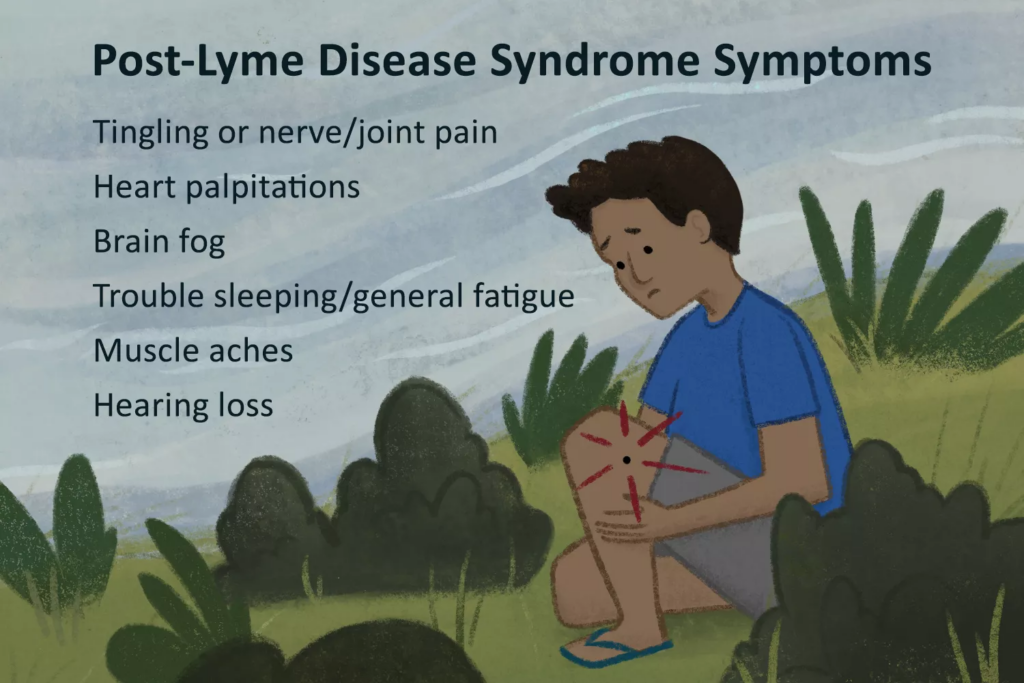Brain Fog and Lyme Disease
What’s Happening?


Have you ever felt like your brain is in a fog—where concentrating feels impossible, you’re forgetful, and even simple tasks seem overwhelming? For many people with Lyme, this mental cloudiness, known as Lyme disease brain fog, is a frustrating reality.
This condition happens when the bacteria that cause Lyme illness impact the brain and nervous system. In such cases daily life activities will become a great challenge, but understanding the symptoms and the ways to manage them helps to a great extent. In this blog let’s see some of the common questions about lyme and brain fog, its causes and ways to find relief.
What causes brain fog in Lyme?
Brain fog in Lyme happens because the bacteria (Borrelia burgdorferi) trigger inflammation in the brain and nervous system.
When you get bitten by a tick carrying Lyme bacteria, the infection spreads through your bloodstream. Sometimes, the bacteria may reach the brain and interrupt the normal brain functions like memory, focus and mental clarity. This is why people with cognitive impairment from Lyme often feel mentally slow or confused.
When the immune system of the body fights against the bacteria accidentally harming healthy brain cells worsening the symptoms. If left untreated, neurological symptoms of Lyme can become severe, so early treatment is key.

How does cognitive impairment from Lyme disease affect daily life?
Cognitive impairment from Lyme disease can make everyday tasks like working, remembering things, and focusing very difficult.
People with Lyme often struggle to do things they used to manage easily. They may suffer from forgetfulness, find it hard to complete tasks at work, or feel constantly drained. This mental exhaustion can put a strain on relationships and make them feel isolated, as others might not understand what they’re going through.
The good news? Knowing that these symptoms are connected to Lyme is the first step toward finding help. Appropriate treatment and support from family members can help people to get confidence and manage their daily lives.
What are the neurological symptoms of Lyme disease?
Neurological symptoms of Lyme disease include mental cloudiness, headaches, facial paralysis, nerve pain, memory loss, and mood swings.
When Lyme disease bacteria reaches the nervous system because of delayed treatment, it may lead to serious health issues. Some people may experience numbness or tingling in their limbs, while others might develop temporary paralysis of the face (called Bell’s palsy). Mental health challenges, such as anxiety or depression, are also common due to the ongoing struggle with mental cloudiness and other symptoms.
These symptoms can show up early or later in the disease, so paying attention to warning signs and seeking medical help early can prevent long-term complications.
Can Mental cloudiness from Lyme disease be reversed?
Yes, mental cloudiness from Lyme disease can often be reversed with treatment and lifestyle changes.
The main goal of the treatment is to treat the root cause of the infection. It is common that doctors usually prescribe antibiotics to fight bacteria and some additional medication depending on the patient’s condition. Sometimes treatment may also include some therapy that helps to improve memory and focus, along with dietary changes to support brain health.
While recovery can take time, many people see significant improvements within a few months. Patience and a comprehensive treatment plan are important for overcoming Lyme disease and mental cloudiness. Some of the complementary therapies like mindfulness can help to get rid of these symptoms fast.
How is Lyme disease brain fog diagnosed?
Lyme disease brain fog is diagnosed by observing symptoms, medical history, and conducting blood tests to confirm the infection.
If you’re experiencing forgetfulness, confusion, or trouble focusing, along with other symptoms like rashes, fever, chillnes, fatigue and you’ve been in tick-prone areas, your doctor might suspect Lyme disease. Blood tests like the ELISA and Western blot are used to confirm the infection. In some cases Neurological tests may also be required to ensure how the disease is affecting your brain.
A proper diagnosis is crucial at the early stage if not diagnosed and treated properly neurological symptoms of Lyme can lead to more serious problems. Early detection ensures that you get the right treatment before the condition worsens.
What are effective treatments for cognitive symptoms of Lyme Illness?
Effective treatments for cognitive symptoms of Lyme illness include antibiotics, anti-inflammatory medications, cognitive exercises, and dietary support.
Antibiotics are the first step to kill the bacteria causing the infection. Anti-inflammatory drugs reduce brain swelling, helping to ease symptoms like mental cloudiness and headaches. Cognitive therapy can help retrain the brain, improving focus and memory.
Dietary changes also play a big role. Foods rich in omega-3 fatty acids, like salmon and walnuts, and antioxidants, like berries and spinach, support brain recovery. Combining medical treatment with healthy habits and other complementary therapy gives the best chance for fast recovery.

Can lifestyle changes improve brain fog from Lyme disease?
Yes, healthy lifestyle changes, like a nutritious diet, regular exercise, and stress management, can help with brain fog from lyme disease.
Eating anti-inflammatory foods (like fish, nuts, and leafy greens) supports brain health. Exercise improves blood flow to the brain, boosting mental clarity and energy. Relaxation techniques, like yoga or meditation, reduce stress, which can make symptoms worse.
Getting enough sleep is also crucial. Establishing a consistent bedtime routine and avoiding screens before bed can improve sleep quality, allowing the brain to heal. When paired with medical care, these changes can make a huge difference in managing Lyme illness.
Conclusion: Overcoming Brain Fog and Lyme Disease
Living with Lyme disease brain fog can be frustrating, but you’re not alone, and there is hope for recovery. By understanding what causes mental cloudiness, recognizing its symptoms, and seeking timely treatment, you can take steps toward feeling better.
Whether it’s through antibiotics, lifestyle changes, or therapies, many people have successfully managed cognitive impairment from Lyme disease and regained their mental clarity. Don’t let brain fog define your life, take action promptly, stay informed, and focus on the path to recovery. With the right support, it’s possible to overcome this challenge and live a full, healthy life.
